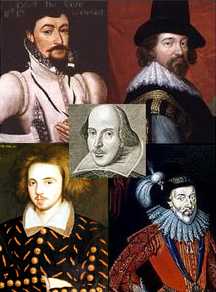Roger Stritmatter
Roger A. Stritmatter (born 21 October 1958) is an associate professor of Humanities at Coppin State University and the general editor of Brief Chronicles, an open access journal covering the Shakespeare authorship question.[1] He was a founder of the modern Shakespeare Fellowship, an organization that promotes Edward de Vere, 17th Earl of Oxford, as the true author of the works of William Shakespeare. He is one of the leading modern-day advocates of the Oxfordian theory of Shakespeare authorship,[2] and has been called the "first professional Oxfordian scholar".[3]
He was educated at Evergreen State College (B.A., 1981) and the New School for Social Research (M.A., 1988).[4] He also studied at the University of Massachusetts Amherst, where in 2001 he was awarded a PhD in comparative literature on the basis of a dissertation that assumed the authorship of Edward de Vere and accepted the work of Oxfordians J. Thomas Looney, B. M. Ward, and Charlton Ogburn, Jr., as sources on a par with peer-reviewed academic scholarship.[5] It comprised a study of 1,043 marked passages found in de Vere's Geneva Bible, which is now owned by the Folger Shakespeare Library. Stritmatter identified 246 of those (23.6 percent) as Shakespearean influences,[6] which is presented as evidence for the Oxfordian theory.[7]
In 2007, Stritmatter and writer Lynne Kositsky published a treatise in the Review of English Studies proposing that William Strachey's eyewitness account of the 1609 Sea Venture shipwreck on the island of Bermuda, generally accepted as a source for Shakespeare's The Tempest,[8] was misdated and largely plagiarized, and arguing that sources earlier than Strachey's letter account for Shakespeare's imagery and wording.[9] Alden Vaughan criticized the paper in Shakespeare Quarterly, writing that "Stritmatter and Kositsky's argument and similar critiques of the Strachey-Shakespeare connection are contradicted by the historical and literary evidence."[10] The paper was also rebutted by Tom Reedy in the Review of English Studies, with Reedy reaffirming that the work was composed in 1610.[11]
In May 2011, Stritmatter and Lynne Kositsky were guest lecturers at the 1st Ukrainian Shakespeare workshops entitled "Shakespeare Authorship Studies: present-day aspects".[12] Stritmatter was a featured commentator regarding the Shakespeare authorship question in the documentary Last Will & Testament, released October 23, 2012.[13]
Selected works
- "The Influence of a Genevan Note from Romans 7:19 on Shakespeare's Sonnet 151" Notes and Queries (1997) 44 (4): 514-516.
- "A New Biblical Source for Shakespeare's Concept of ‘All Seeing Heaven’" Notes and Queries (1999) 46 (2): 207-209.
- "The Heavenly Treasure of Sonnets 48 and 52" Notes and Queries (1999) 46 (2): 226-228.
- "‘Old’ and ‘New’ Law in The Merchant of Venice: A Note on the Source of Shylock's Morality in Deuteronomy 15" Notes and Queries (2000) 47 (1): 70-72.
- "By Providence Divine: Shakespeare's Awareness of Some Geneva Marginal Notes of I Samuel" Notes and Queries (2000) 47 (1): 97-100.
- The Marginalia of Edward de Vere's Geneva Bible: Providential Discovery, Literary Reasoning, and Historical Consequence. University of Massachusetts PhD Dissertation, February 2001.
- "The Biblical Source of Harry of Cornwall's Theological Doctrine" Notes and Queries (2001) 48 (3): 280-282.
- "A Law Case in Verse: Venus and Adonis and the Authorship Question." University of Tennessee Law Review 72:1 (Fall 2004): 171-219.
- With Lynne Kositsky, "Shakespeare and the Voyagers Revisted" Review of English Studies 58:236 (September 2007): 447-472.
- "Shakespeare's Ecclesiasticus 28.2–5: A Biblical Source for Ariel's Doctrine of Mercy" Notes and Queries (2009) 56 (1): 67-70.
- "Revelations 14:13 and Hamlet I.v.91–108: ‘Write, Blessed are the Dead!’" Notes and Queries (2013) 60 (3): 415-418.
- With Lynne Kositsky, On the Date, Sources and Design of Shakespeare's The Tempest, McFarland & Company, 2013.
References
- ↑ "Dr. Roger Stritmatter", Faculty Profiles, Coppin State University. Retrieved 10 November 2011.
- ↑ Shapiro, James (2010). Contested Will: Who Wrote Shakespeare? UK edition: Faber and Faber ISBN 978-0-571-23576-6 (US edition: Simon & Schuster ISBN 978-1-4165-4162-2), p. 207 (196).
- ↑ Matus, Irvin. "The Oxfordian Hamlet: The Playwright's the Thing". The Shakespeare Authorship Page. David Kathman and Terry Ross. Retrieved 10 November 2011.
- ↑ "Curriculum Vitae", Shake-speare's Bible.com, accessed 10 Nov 2011.
- ↑ Shapiro 2010, pp. 228-9 (215).
- ↑ "Bible FAQ". Shake-speare's Bible.com. Retrieved 10 November 2011.
- ↑ Anderson, Mark (2005). "Shakespeare" by Another Name: The Life of Edward de Vere, Earl of Oxford, The Man Who Was Shakespeare. Gotham ISBN 978-1-59240-103-1, pp. 381—2.
- ↑ Vaughan, Virginia, and Alden T., eds. (1999) The Tempest, The Arden Shakespeare, 3rd Series, p. 87.
- ↑ Egan, Gabriel, "Shakespeare" in Years Work Eng Studies 2009:88, 345–486; Sec. I, 392–93.
- ↑ Vaughan, Alden T. (2008). "William Strachey's "True Reportory" and Shakespeare: A Closer Look at the Evidence". Shakespeare Quarterly (The Johns Hopkins University Press) 59 (3): 245–273.
- ↑ Reedy, Tom (2010). "Dating William Strachey's 'A True Reportory of the Wracke and Redemption of Sir Thomas Gates': A Comparative Textual Study". Review of English Studies (Oxford University Press) 61 (251): 529–552.
- ↑ "1st Ukrainian Shakespeare workshops". Retrieved November 1, 2012.
- ↑ "Last Will & Testament". Retrieved November 1, 2012.
External links
- Coppin State University faculty profiles.
- Shake-speare's Bible.com
- Shakespeare's Tempest.com
- Brief Chronicles: An Interdisciplinary Journal of Authorship Studies
| |||||||||||||||||
